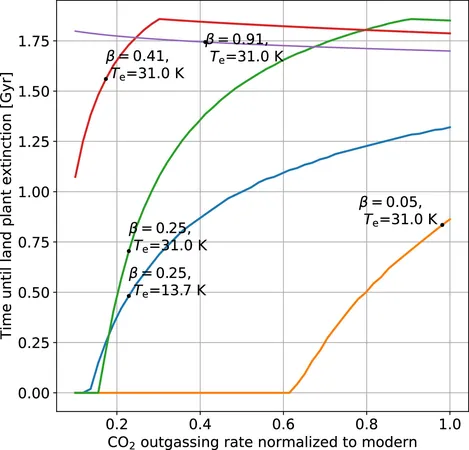
Breakthrough Discovery Extends Future of Plant Life on Earth by Billions of Years!
2024-12-31
Author: Jia
Breakthrough Discovery Extends Future of Plant Life on Earth by Billions of Years!
In a remarkable stride for environmental science, researchers at the University of Chicago and the Weizmann Institute of Science in Israel have published groundbreaking findings that extend the expected lifespan of plant life on Earth to a staggering 1.7 billion years! This incredible revelation comes at a time when humanity grapples with the realities of climate change and the potential extinction of the biosphere.
Historically, scientists believed that as the sun’s luminosity gradually increases — at a rate of about 1% every 110 million years — the Earth's surface would inevitably grow warmer. This leads to a decrease in silicate weathering, a natural process essential for maintaining levels of atmospheric carbon dioxide (CO2), which plants rely on for survival. With climate models predicting plant extinction timelines ranging from 100 million to 1 billion years due to CO2 starvation and rising temperatures, anything beyond that seemed like a distant dream.
However, the new model suggests that if weathering is less sensitive to temperature and more dependent on CO2 levels than previously thought, there may be a temporary reversal in the decline of plant life. The researchers emphasize that the balance between climate changes, plant productivity, and weathering could slow the advance of CO2 depletion, giving plant life a reprieve.
"By assuming a complex interaction between these factors," they stated, "we predict that the decline of CO2 levels—and consequently the survival of plants—could be prolonged, pushing the extinction timeline far into the future."
Their analysis tackles two main extinction scenarios: one involving insufficient CO2 and another focused on overheating. Alarmingly, they conclude that for the earth, conditions will peak with surface temperatures soaring up to 335 K (62°C)! The present average temperature is only about 289 K (16°C), meaning that a drastic climate shift is inevitable.
Interestingly, the study delves into the capabilities of different types of plants—C3 and C4. With C3 plants making up approximately 95% of Earth's flora, the research finds that these species may face extinction long before their C4 counterparts, which includes species like sugarcane and maize. The result? A future where, for nearly 500 million years, only C4 plants may thrive.
This extended timeline for the survival of plant life has fascinating implications beyond Earth. The scientists posit that if life is indeed prevalent elsewhere in the universe, their findings could aid in the search for biosignatures—or indicators of life—on exoplanets.
Moreover, a longer lifespan for our biosphere could mean a more favorable environment for the emergence of intelligent life forms. The researchers contrast their findings with earlier models, suggesting that fewer critical evolutionary transitions or "hard steps" may be required for intelligent life to arise. Instead of the previously estimated 4-5 transitions, their calculations propose it could drop to just 2.4 — making the existence of intelligent extraterrestrial life more plausible than ever!
In conclusion, this revolutionary study illuminates not only the fate of plant life on Earth but also the broader implications for biodiversity and the potential for intelligent life across the cosmos. Stay tuned as we continue to unravel the mysteries of our planet and beyond!

 Brasil (PT)
Brasil (PT)
 Canada (EN)
Canada (EN)
 Chile (ES)
Chile (ES)
 Česko (CS)
Česko (CS)
 대한민국 (KO)
대한민국 (KO)
 España (ES)
España (ES)
 France (FR)
France (FR)
 Hong Kong (EN)
Hong Kong (EN)
 Italia (IT)
Italia (IT)
 日本 (JA)
日本 (JA)
 Magyarország (HU)
Magyarország (HU)
 Norge (NO)
Norge (NO)
 Polska (PL)
Polska (PL)
 Schweiz (DE)
Schweiz (DE)
 Singapore (EN)
Singapore (EN)
 Sverige (SV)
Sverige (SV)
 Suomi (FI)
Suomi (FI)
 Türkiye (TR)
Türkiye (TR)
 الإمارات العربية المتحدة (AR)
الإمارات العربية المتحدة (AR)